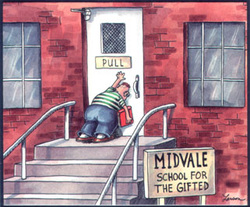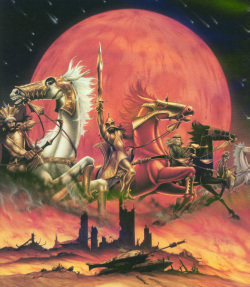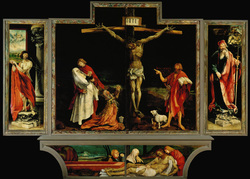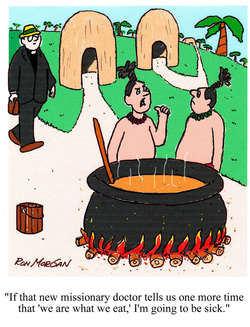 Here is one of my favorite Gary Larsen “Far Side” cartoons. That boy is just like us. We’re not too good at reading the signs.The disciples were not too good at reading the signs; at least, not the signs that matter. They were sitting there opposite the massive Temple, gaping at the shining stones and dazzling jewels, perhaps thinking silently that the Temple building is what connects them to God. Then Jesus, unimpressed, tells them, “All of that is going to be nothing more than a pile of rubble.” The disciples, shocked, ask, “Teacher, when will this be? What will be the sign that this will take place?” They want to know when the Temple will be destroyed. They want a sign to look for. I can’t help but chuckle at Jesus’ answer, because it’s so obvious. The sign is not esoteric, hidden or mysterious at all. Basically Jesus tells them, “Well, when you see an army camped around the Temple about to take it over, that’s going to be the end of it. They’re going to tear it down.” Here’s your sign. Sure enough, around the year A.D. 70 a large Roman army razed the Temple to the ground: not one stone left on another, every one of them thrown down. The sign Jesus gave could be trusted.  In the next breath, though, Jesus goes on to speak of other signs. Jesus moves from describing the signs of the destruction of the Temple to describing the signs that will be seen when he returns, when he comes again in final victory. And again, his message seems to be that signs of the final victory will be obvious. They won’t be esoteric or mysterious or hidden. He says, “There will be signs in the sun, the moon, and the stars, the roaring of the sea, people fainting, the powers of the heavens shaken, the Son of Man coming in a cloud.” I don’t know about you, but if tomorrow I were to see crazy stuff happening in the sun and moon and stars and then see the Son of Man surfing a cloud up at the sky, I won’t need an expert in the end times to let me know that maybe something’s going on. In a sense, the Kingdom of God is always near. And when it comes in its fullness, Jesus says, “Trust me, you’ll know.” So we don’t have to be like the little kid on the long car trip who keeps asking every ten minutes, “Are we there yet?” “Are we almost there yet?” When we get there, we’ll know. The kingdom is near, and it's coming with all its fullness soon. And until then, I can't help but think that Jesus is more interested in the signs to be seen here on earth than the signs to be seen in the heavens -- not signs in the sun and moon and stars, but signs in you and me. We're not so much looking for signs; we are the signs. Signs of God's kingdom. We live the heavenly life here on earth, signs pointing to God's good future and final victory.  The theologian Karl Barth had a painting of the crucifixion by the artist Matthias Grunewald on the wall of his study. In the painting there is an image of John the Baptist, his extra long finger raised, directing and pointing the onlooker to the cross of Jesus. It’s said that when Barth would talk with visitors about his work, he would direct them to John the Baptist in the painting, and he would say, “I want to be that finger.” I want to be a sign pointing to the victory of Christ.” We are the people who have read the end of the book. We know how the story ends. We know God is victorious. And so we as God’s people, in our life of love together, it’s not that we stand on a corner holding a sign that says, “The End is Near.” But we live in such a way that our life is a sign reading, “The New Beginning is Near.” We are the beachhead of the kingdom. We’re like the trailer of a movie that makes people look forward to seeing the full show. We’re like the warm-up act that gets people pumped up for the concert that is about to begin. We’re the appetizer that makes people hunger for the full feast. People don’t have to travel through time on a mysterious island or gaze into a crystal ball to look into the future. They can simply look at the life of the faithful, loving Christian. The sign Jesus gives can be trusted.
0 Comments
 A missionary meets a cannibal, and it does not go well. He is eaten. But the cannibal is so impressed by the demeanor of the missionary as he awaits death, that he is converted. So how will these two be raised from the dead? Part of the missionary would have to be part of the cannibal! This was the gist of an atheist pamphlet that triumphantly concluded it had so ridiculed the notion of resurrection, and its logical knots and impossibilities, that no one could possibly continue to believe in it. A similar argument is being used by the Sadducees against Jesus in the Luke reading for this week. They are confident they have exposed the notion of resurrection for the stupidity which it is. The Sadducees were being snarky, for sure. They weren’t talking about their own deaths or the death of their loved ones. They were trying to trip Jesus up in the ridiculous nature of the scenario they spun. If a woman is married 7 times in this world, to whom will she belong in the next world when all the resurrected people get back together again? Jesus tells them they have completely missed the point. Yes, they have outlined the custom of Levirate marriage, which was a way of ensuring the continuance of the family line, even if they use an extreme example. To make sure his family line was continued if a man died, his brother provided an heir with the surviving wife. Jesus disputes nothing about the custom. But the Sadducees assume in their argument that resurrection life is of the same quality, or same order, as our present life. They expect people will marry, for example. Their argument depends on this. They are wrong, according to Jesus, because the life of the resurrection will be fundamentally different. "They neither marry, nor are given in marriage." So what is resurrection? We can see that there is a problem with treating it as being of the same qualitative order as this life; it makes no sense. Jesus also understood it as different to life now. "They neither marry, nor are given in marriage … they do not die because they are angels and children of God, being children of resurrection." Resurrection is about a new kind of life in every respect. Although Jesus is answering the Sadducees, he is also addressing everyone within earshot, and some of them have very real concerns about the nature of resurrection. What will it be like after we die? Levirate marriage, as the Sadducees were describing, existed for the purpose of ensuring children to men in the patrilineal system. If we give the benefit of a doubt, we could consider that levirate marriage protected women by giving them a household to belong to when their husbands died. But if everyone is a child of God, then issues of lineage no longer apply. Everyone has a “name” in the family of God—they are children of the resurrection, not children of men. Even women have a household to belong to, the household of God, and they no longer need marriage to ensure that. Marriage is, of course, a huge issue in our contemporary society too. Who gets to marry whom, and what does it mean? The Sadducees asked their question based on the law, the books of Moses, and Jesus gave an answer rooted in the same text. They talked about women belonging to men, and Jesus talked about people belonging to God. Ultimately resurrection is about trust in the goodness of God. Resurrection reflects a thirst for justice, and a hope that God is just rather than arbitrary and unfair, or powerless. Resurrection is a trust in the love of God that includes us in a household that is more loving than any we experience on earth. And so we can persevere in this life, knowing that we belong to God and the relationship we have with the God of the living transcends even death.  Luke 19:1-10. Zacchaeus, the Patron Saint of Tree Climbers, was -- as the old Sunday school song tells us -- a "wee little man." Zacchaeus was a chief tax collector -- a local entrepreneur who employed other tax collectors to collect all the tolls, tariffs and taxes in the local area, in this case the town of Jericho. The tax collectors could charge the people whatever tax bill they wanted as long as their Roman overseers got paid the appropriate share. Whatever was left over got pocketed by the tax collectors as profit, and no one in that system would have profited more than a man like Zacchaeus. It's no wonder, then, that tax collectors were among the most hated people in first-century Israel. They were the ones who often left their fellow Judeans "up a tree" over their heavy taxes and shrinking incomes. Jesus, however, seemed to gravitate toward these nefarious entrepreneurs. He chose the tax collector, Matthew, to be one of his disciples, and earlier in Luke's gospel, the religious establishment repeatedly mocks Jesus for being a "friend of tax collectors and sinners." Maybe that's why Zacchaeus wants so desperately to see Jesus -- the tax collector doesn't have any other friends, only enemies among the townspeople. Zacchaeus wants to see Jesus so badly, in fact, that he "ran ahead and climbed a sycamore tree to see him because he was going to pass that way" (19:4). As Jesus came into town, he noticed Zacchaeus there, up a tree in more ways than one. For Zacchaeus and for many people who find themselves on the margins of society, being up and away from the crowd can be a safe refuge. Ultimately, however, living in the trees doesn't work. Eventually, you have to come down, and, when you do, it's better to have someone there to catch you. Jesus looked at Zacchaeus hanging on a sycamore branch and said, "Zacchaeus, hurry and come down; for I must stay at your house today" (v. 5). Jesus calls him down from being up a tree, out on a limb and hanging onto life by his fingernails. In doing so, Jesus continues to be guilty as charged for hanging out with all the wrong people. Indeed, the crowd began to "grumble," saying, "He has gone to be the guest of one who is a sinner" (v. 7). Zacchaeus had gone up a tree seeking Jesus, but it was Jesus who came seeking Zacchaeus on his way to Jerusalem. "The Son of Man came to seek out and save the lost," says Jesus, and showing up in the house of this tiny tax collector demonstrated to everyone in the crowd that those who were up a tree in their lives were the ones Jesus was and is seeking. Interestingly, that last statement of Jesus in this passage has most often been used to suggest that saving "the lost" is all about private and personal conversion, which results in getting someone's soul into heaven at death. What happens to Zacchaeus, however, is a much more comprehensive kind of salvation -- It is a salvation that comes to the whole "house" and results in a transformative healing of the whole person in the present, not just the future. The salvation that Jesus offers changes Zacchaeus' life through and through, and, as a result, it benefits those around him. The poor benefit from Zacchaeus' change from greed to generosity, receiving half of the tax collector's possessions, which would have been substantial. Those who have been defrauded by Zacchaeus' corrupt actions will receive a four-fold restitution, making them suddenly solvent and secure again (v. 8). When Zacchaeus is saved, the whole community benefits. When the lost are found, the trees get shaken and everyone enjoys the "fruit" that comes from repentance (3:8). Jesus came looking for people who were up a tree. Indeed, we've all been up a tree ever since that day in the garden when our spiritual ancestors went up a tree looking for something other than God (Genesis 3). Jesus has come to invite us down, to offer us a new life, to live lives that reflect the kind of healing, wholeness and salvation his kingdom brings. |
Rev. Dr. Shannon SmytheUnited Presbyterian Church Archives
March 2023
Categories |
Address 12 Yardville-Hamilton Square Road, Yardville, NJ 08620 Phone 609-585-5770 Email [email protected]

 RSS Feed
RSS Feed